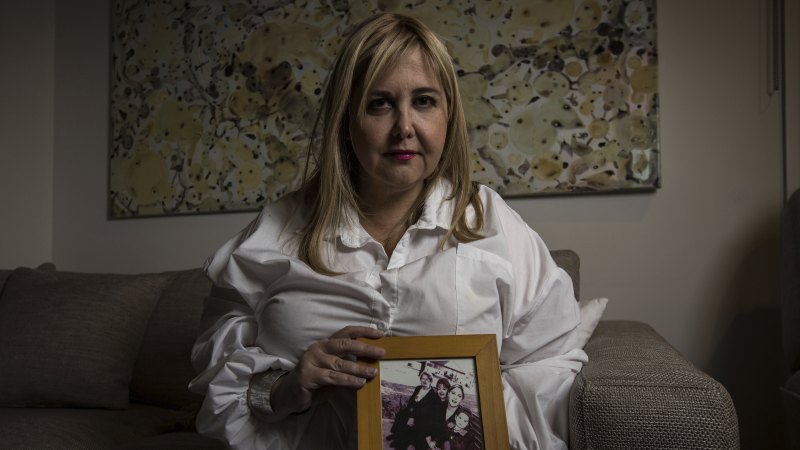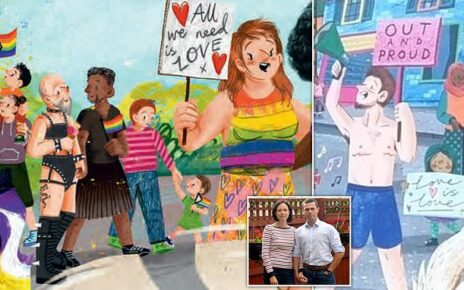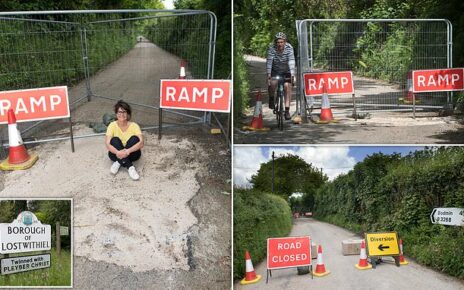By Melissa Cunningham and Henrietta Cook
Save articles for later
Add articles to your saved list and come back to them any time.
It was not the death 80-year-old Luba Aronovitch had wanted.
The trained midwife and beauty therapist, who passed away three weeks ago with advanced dementia, told her family and friends many times she wanted to access voluntary assisted dying when she lost her independence and could no longer communicate.
Judith Aronovitch holds pictures of her mother Luba.Credit: Darrian Traynor
In the end, her daughter Judith spent five nights in a palliative care facility sleeping by Luba’s side as she moaned in agony.
She clutched at her neck, telling her only daughter in Polish: “I’m choking.”
“It was the most horrific thing I have ever seen,” Aronovitch says. “It was everything she didn’t want to happen. It was torturous. She was letting out these quiet screams. She was crying, but because she was so dehydrated, there were no tears.”
As Victoria’s landmark voluntary assisted dying legislation comes up for review, doctors, families and patients are calling for the scheme to be expanded to include people with dementia.
It’s an illness that accounts for almost 10 per cent of all deaths nationally and is the leading cause of mortality for women.
Those with dementia face a catch-22: in the earlier stages of the disease, they have the mental capacity to request voluntary assisted dying but they do not meet strict eligibility criteria because their death is not imminent. Once dementia advances, they are shut out of the laws because they are no longer able to consent.
Luba Aronovitch
Beverly Baker, the president of the National Older Women’s Network, supports the expansion of voluntary assisted dying to include people with dementia but says it’s an area that needs a “massive amount” of care and protections.
She says safeguards including advanced care directives – a plan that documents a person’s preference for future medical treatment – are needed to ensure a “manipulative relative” doesn’t kill off their parents to claim their inheritance.
Baker is concerned that without the option of voluntary assisted dying, people with dementia might contemplate suicide.
“That’s cruel to the people who find your body,” she says. “That’s cruel to your family if they are engaged in it because they can be prosecuted.”
When Kevyn Morris was diagnosed with dementia six years ago, he sat down with his lawyer and wife and wrote an end-of-life plan in the hope that Victoria’s voluntary assisted dying laws would change.
It stated that he wanted to access voluntary assisted dying when he could no longer look after himself.
Kevyn Morris was diagnosed with dementia six years ago and wants to access voluntary assisted dying.
While Morris currently has a good quality of life and keeps himself busy with family, travel, photography and as an advisory committee member for Dementia Australia, he knows this will not always be the case.
Morris’ dementia is slowly progressing. He sometimes forgets words, gets lost in conversation and struggles with tasks he previously found easy like oil painting.
“If I end up sitting in a chair staring out at nothing or flat on my back in a bed, then that is not a life for me,” the 62-year-old Wodonga man says.
“That would be cruel. If you were a horse, you would be put down and no one would blink an eyelid.”
Intensive care specialist Dr Bill Silvester, who is pushing for legislation to be expanded, believes the current voluntary assisted dying laws discriminate against people with dementia.
“They can’t record ahead of time what they would want under circumstances and just because they have dementia does not mean the views they had in the past are not valid,” he says.
Silvester, who is director of Respecting Patient Choices, added that people with dementia who were diagnosed with another incurable disease that caused them suffering such as cancer, were being doubly disadvantaged.
“They would otherwise meet the criteria but because they have dementia they are missing out and that is discrimination in itself,” he says.
Melbourne geriatrician Associate Professor Peter Lange, who sits on the board of Dying with Dignity, says there is a popular misconception that dementia is an illness where people become “pleasantly confused”.
Dementia is not one specific disease, but a term used to describe symptoms caused by a group of brain diseases including Alzheimer’s. As the condition progresses, people can develop behavioural and psychotic dementia symptoms that are very distressing, including aggression and hallucinations.
“It can be pretty, pretty hideous,” Lange says.
In the later stages of the condition, people can have difficulty swallowing and food, saliva or liquid can get trapped in the lungs or airways, triggering aspiration. Another common cause of death for people with dementia is pneumonia.
Lange wants a national debate on dementia and dying. He says Australians must first understand the disease before they can weigh up the ethics of upholding a person’s wish to die.
“Every Australian is going to have to deal with somebody dying of dementia,” Lange says. “They need to know the reality.”
Emergency physician Stephen Parnis, who has been a vocal opponent of voluntary assisted dying, is horrified by the prospect of people with dementia accessing the scheme.
“Who makes the decision about when a certain point has been reached?” the former vice president of the Australian Medical Association asks. “Who provides the medication? Who oversees the process?”
Parnis believes debate about expanding access to voluntary assisted dying is a distraction from the real issue at play: improving the quality of life for people with dementia.
He believes people with dementia can have “wonderful, enjoyable” lives if they are provided with appropriate care. But he says good care is often predicated on a person’s postcode or social circumstances.
Eurydice Deftereos lost her mother to dementia in 2021 and is still traumatised by what she witnessed in the years before her death.Credit: Eddie Jim
“I think it is so seductive for policymakers and the community to say, ‘this suffering is too hard, let’s just find the escape clause’ which means we don’t have to think about the more complex ways of delivering care,” he says.
Eurydice Deftereos has been left traumatised by her mother Vicki’s slow and painful decline from dementia.
Between 2013 and her death in 2021, Vicki became incontinent, stopped talking and became severely immobile. She progressively lost the ability to chew and swallow.
The once independent and intelligent woman – who migrated to Australia from Greece in 1965 – became confused and paranoid, and would sometimes hit her daughter.
Her teeth rotted because she refused to open her mouth to let her family brush them. Deftereos says she effectively died of dehydration and starvation.
“Dementia doesn’t just impact the mind. It leads to a full destruction of the body.”
As well as trying to process what happened to her mother, the 45-year-old is grieving the loss of more than a decade of her life, which she spent looking after her mother in the family home in Elwood.
Vicki Deftereos died of dementia in 2021.
“It is hard to understand how consuming it is,” she says.
“I worked full-time and then spent every evening and weekend providing care and support including cleaning, cooking and house maintenance. I’m burnt out, I lost my health, most of my friends and my career has also been impacted. She would have been horrified.”
Long before her diagnosis, Vicki told her family that she wanted to end her life if she ended up in a situation where she could no longer take care of herself.
Deftereos would like to see voluntary assisted dying extended to people with dementia so they don’t have to suffer like her mother.
Victorian geriatrician, Kate Gregorevic, who has cared for hundreds of patients with dementia at the end of their lives, believes people with dementia deserve a choice about whether they would want voluntary assisted dying.
“The moral and ethical issues this raises are complex, but with a robust ethical framework, I think that voluntary assisted dying should be available to people with dementia as part of an advanced care plan,” Gregorevic wrote in an opinion piece for The Age this week.
The Netherlands legalised voluntary assisted dying for people with dementia in the early 2000s, with citizens able to lodge an advanced request to die following their diagnosis. It is then up to families and doctors to activate the plan.
However, Professor Ben White from the Queensland University of Technology’s Australian Centre for Health Law Research says assisted dying among people with severe dementia remains very rare in the Netherlands, in part because many doctors feel uncomfortable granting wishes without the patient being able to reaffirm consent.
In 2021, only six people with advanced dementia died using the laws in the Netherlands, but there were 209 others who ended their lives in earlier stages of the condition, while they were deemed mentally competent to consent.
Belgium allows assisted dying for dementia but the laws are stringent and it occurs rarely. In Canada, people with dementia were recently granted access to assisted dying, but they must request it and end their lives while they still have the mental capacity.
Go Gentle chief executive Dr Linda Swan says the organisation is inundated with inquiries from people with dementia who wanted to access assisted dying.
“Many of them are quite surprised and disappointed when we need to communicate that under the current laws, you can’t,” Swan says. “A lot of people are very fearful, particularly with dementia … about what the end of life is going to look like.”
During lucid moments, Luba, who migrated to Melbourne from Israel in the 1960s and also had a terminal blood disease, pleaded with her daughter and palliative care staff, saying: “Please, I’ve had enough. I want to depart from this earth” and “please give me an injection to die”.
Luba Aronovitch with her daughter Judith Aronovitch.
Luba explicitly outlined her wishes for assisted dying in an advance care directive, written in 2021, before her cognitive decline. In the end, she died after experiencing severe aspiration in her final days.
Aronovitch, who is now campaigning to get the laws changed, chooses to remember her mother before dementia took hold: fearless, a master of Bridge, a polyglot, resilient, clever, kind, funny and never without her bright lipstick.
“If I had a crystal ball and I showed my mother how she would die in three years’ time, she would have said: ‘kill me now, please do anything so I don’t end up like this’,” Aronovitch says. “People deserve a choice.”
Dementia Australia says it supports the right of every person, including those living with dementia, to have a choice over voluntary assisted dying.
A spokesman for the Victorian Department of Health says ensuring access to voluntary assisted dying for those who need it is the government’s priority. He says feedback on all aspects of the program will be considered when the review is conducted.
More information on voluntary assisted dying is available here.
If you are troubled by this report or experiencing a personal crisis, you can call Lifeline 131 114 or beyondblue 1300 224 636 or visit lifeline.org.au or beyondblue.com.au
Most Viewed in National
Source: Read Full Article








